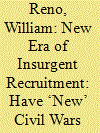| Srl | Item |
| 1 |
ID:
162252


|
|
|
|
|
| Summary/Abstract |
The historical proximity between the Arabian Peninsula and the Horn of Africa has in recent years been increasingly experienced as a relationship of growing insecurity. Gulf States have rapidly expanded their economic and political roles on the other side of the Red Sea and have established military bases. This article argues that this interventionist thrust is historically rooted and deeply structural: the politics of state survival that dominate both the Gulf and the Horn are leading aspiring regional hegemons with a self-proclaimed responsibility to provide order to securitise their near abroad. Originating from the self-identity of regional powers and efforts to protect their respective domestic political settlements, this is producing a profoundly destabilising pattern of regional polarisation.
|
|
|
|
|
|
|
|
|
|
|
|
|
|
|
|
| 2 |
ID:
162253


|
|
|
|
|
| Summary/Abstract |
This article surveys the way in which political scientists and non-traditional scholars have analysed insurgencies and counterinsurgencies. We contend that insurgent recruitment is different in ‘new’ wars due to globalisation. We note continuity in ‘old’ and ‘new’ civil wars, but that collapsed states and the ascent of new types of insurgents with different power bases is markedly different from a pre-globalised era. While there is nothing new about the concept of contemporary insurgent recruiting processes, recruitment efforts have shifted towards a global audience, drastically changing the context and character of these wars and the ways in which they are waged.
|
|
|
|
|
|
|
|
|
|
|
|
|
|
|
|
| 3 |
ID:
162255


|
|
|
|
|
| Summary/Abstract |
Scholars of conflict often rely on fieldwork to study behaviours of civilians and combatants on the ground. A list experiment is a potentially useful tool for conflict scholars, as this survey methodology is designed to indirectly obtain truthful self-reports of behaviours while preserving the respondents’ anonymity. Acknowledging its advantages, this article also reviews the often overlooked shortcomings of list experiments as a survey method in conflict zones, including those limitations that cannot be corrected with better design or implementation. As an illustration, we discuss the list experiment employed to measure civilian assistance to the insurgents in the Donbas War.
|
|
|
|
|
|
|
|
|
|
|
|
|
|
|
|
| 4 |
ID:
162251


|
|
|
|
|
| Summary/Abstract |
This paper views cease-fires as being multifaceted with the potential for having diverse consequences for rebel governance development. It uses the February 2016 cease-fire for Syria as a lens through which to examine the interplay of order and violence at the national level on the development of local governance institutions in Syria’s southern Dara’a province. It argues that cease-fires do not simply end or freeze hostilities but rather are political instruments that recalibrate complex systems of layered governance.
|
|
|
|
|
|
|
|
|
|
|
|
|
|
|
|
| 5 |
ID:
162254


|
|
|
|
|
| Summary/Abstract |
What factors affect women’s political participation in wartime? Previous scholarship has found several benefits associated with women’s participation in the peace process and in post-conflict society. However, little is known about what drives women’s political participation during or after civil war. This article addresses the former and examines two factors – the type of civilian governance structure and the degree of autonomy of women’s groups – to determine their effect on women’s participation in communities experiencing conflict. Drawing on fieldwork in Thailand and Burma/Myanmar, this article uses the conflict between the Burmese government and the Karen National Union to explore this relationship.
|
|
|
|
|
|
|
|
|
|
|
|
|
|
|
|